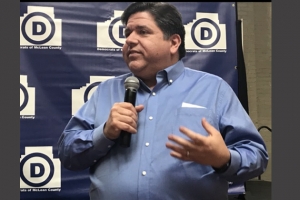
By Illinois Radio Network
SPRINGFIELD – Gov. J.B. Pritzker said the state’s next budget will be balanced, but said if voters don’t approve a progressive income tax in November, he would have to reduce state spending across the board in future years.
The governor is preparing to deliver his budget address later this month. He said Friday that the progressive tax was needed to address “income inequality” and increase state spending on things like education.
Voters will decide whether to change Illinois’ flat income tax to a structure with higher rates for higher earners at the ballot box in November. If voters approve a progressive income tax, it wouldn’t go into effect until after the upcoming budget year, which begins in July.
On Friday, Pritzker told Politico at a conference in Washington D.C. that we would present a balanced budget. However, if voters don’t approve the progressive income tax this November, the governor said 15 percent cuts in state spending would be needed across the board.
“We have to pay interest on our debt and all the other things that are fixed and then you get to what people call discretionary spending and that’s where you’d have to make all these cuts,” Pritzker said. “And these are the things that affect people’s lives, particularly the middle-class and working families across the state.”
Illinois’ most recent budget called for spending about $40 billion dollars in state money. The state spends another $40 billion of federal tax money.
The governor has said his progressive income tax would increase taxes by more than $3 billion and result in modest income tax reductions for more than 97 percent of taxpayers. However, business groups have said the progressive income tax will hurt small businesses, which they said could affect the economy and push more people to move out of Illinois.
Pritzker is set to deliver his budget address on Feb. 19. He said he will propose a balanced budget to begin in July without relying on revenue from the proposed progressive income tax.
“So not only do we need to balance the budget, but we also need to pay down the backlog of bills and we need to deal with other challenges throughout the state like lowering property taxes,” Pritzker said.
The state’s backlog of bills stood at $6.7 billion, according to the most recent state estimates. That’s dwarfed by more than $200 billion in debt from the state’s worst-in-the-nation funded public employee pensions. Illinois also has among the highest property taxes of any state in the nation.
Pritzker said Friday that the state needs more revenue to increase education funding to help reduce local property taxes. He said that could be done with a progressive income tax.
“We need a tax system that helps us pay the bills and helps us address the income inequality issue,” Pritzker said.
Illinois Chamber of Commerce CEO Todd Maisch said going from flat tax – where everyone pays the same income tax rate – to a structure with higher rates for higher earners, including small businesses would eliminate what he called “our current, true fair tax.” Pritzker has called his proposed progressive income tax a fair tax.
“It is already having a chilling effect on employers’ willingness to invest in Illinois,” Maisch said. He pointed to other mandates such as the state’s $15 minimum wage, which will be phased in over several years. The state’s minimum wage has already increased once this year and will increase again in July.
“A focus on our greatest job producers, small business, must be a priority in 2020 to balance the negative effects of 2019 policies,” Maisch said.
Illinois Radio Network can be reached at [email protected].







